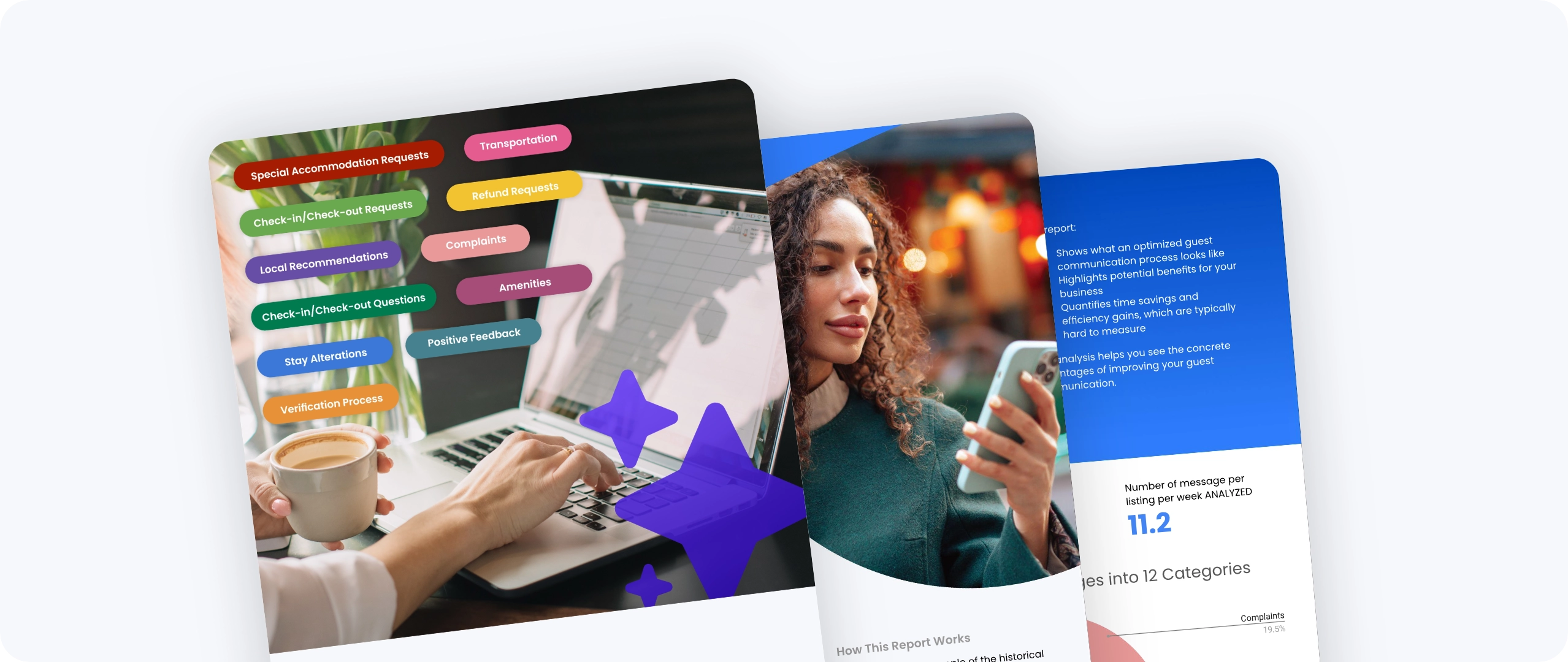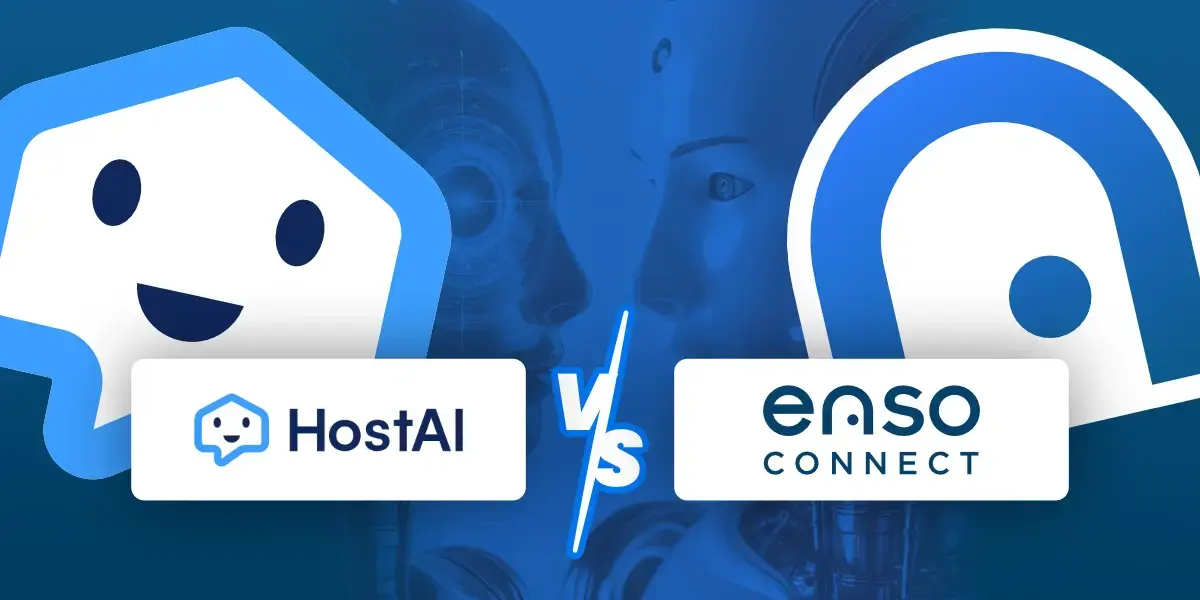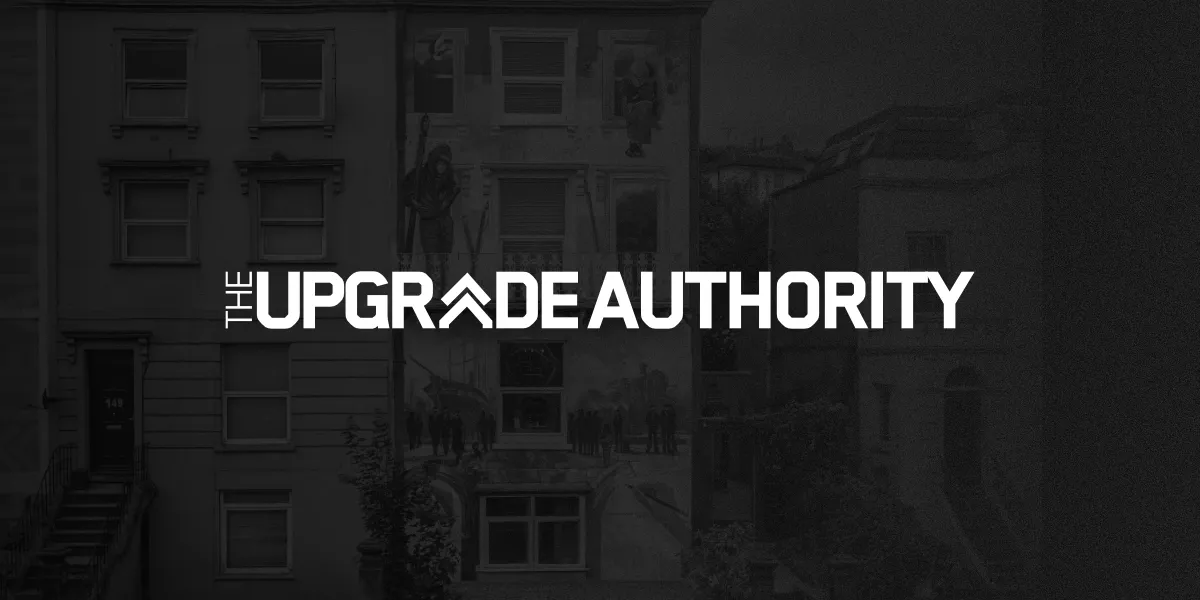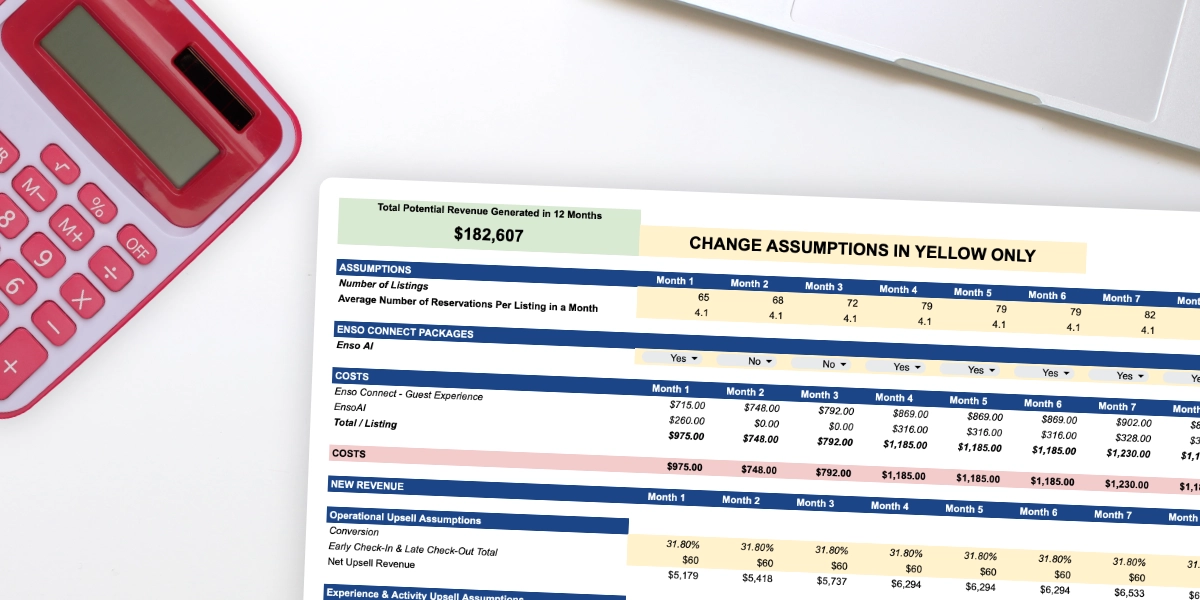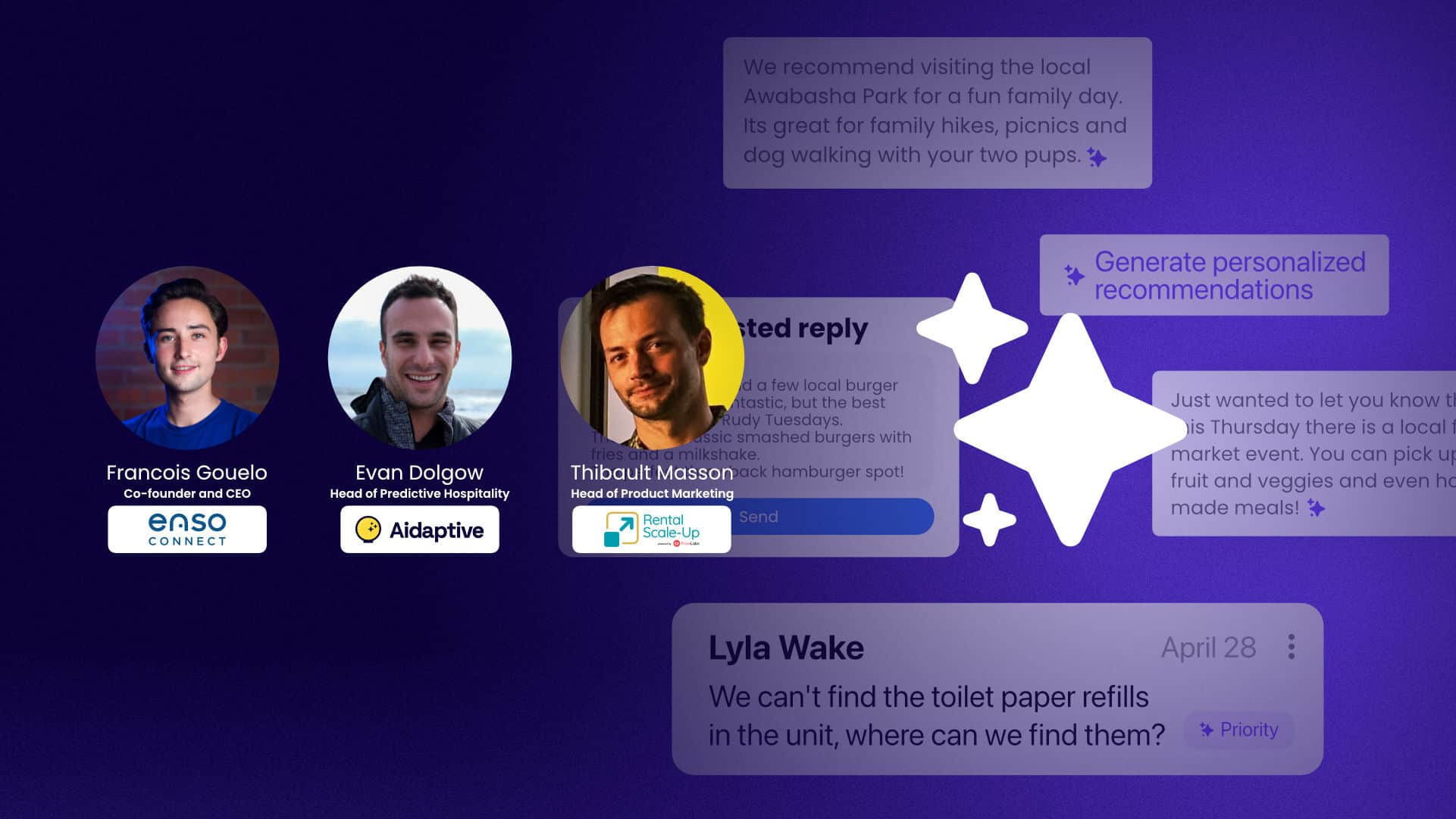AI has revolutionized many industries, and it’s time for hospitality professionals to harness this transformative technology for their businesses. Major e-commerce brands and OTAs like Booking.com and Airbnb have been leveraging machine learning and AI for years to optimize their operations and enhance guest experiences. However, as AI solutions become more accessible, smaller businesses now have the opportunity to adopt this technology and achieve similar success.
To explore how AI can be utilized in the hospitality sector, we invited subject matter experts to delve into the latest advancements and practical use cases of generative artificial intelligence. Our live event featured an insightful discussion on predictive hospitality, highlighting how AI can anticipate guest needs and streamline operations. The event also included a Q&A session, providing attendees with valuable insights on implementing AI solutions to improve their business outcomes and stay competitive in the evolving hospitality landscape.
Webinar speakers
-
Thibault Masson, Rental Scale-Up
-
Francois Gouelo, Confounder and CEO of Enso Connect
-
Evan Dolgow, Head of Predictive Hospitality, Aidaptive
Watch the webinar recap
Machine learning and artificial intelligence: what is the difference?
We hear about AI everywhere, but what does that really mean for the hospitality industry? In reality, “AI” is a broad term that often gets used interchangeably with chatbots or other technologies perceived as artificial intelligence. However, what people are actually referring to are more specific technologies such as machine learning and natural language processing (NLP) models.
Machine learning involves algorithms that improve their performance over time by learning from data. This technology can enhance various aspects of hospitality operations, from predictive analytics to personalized guest experiences. Natural language processing, on the other hand, enables machines to understand and generate human language in a way that is both contextually relevant and useful.
In the context of hospitality, these technologies can be applied to optimize booking systems, enhance customer service through intelligent chatbots, and analyze guest feedback to tailor services more effectively. Understanding the distinction between these technologies and their specific applications helps hospitality professionals make informed decisions about integrating AI into their operations, ultimately leading to more efficient and personalized guest experiences.
What is machine learning?
Machine learning (ML) is a powerful tool that enables the gathering and processing of vast amounts of data to extract meaningful insights. In many businesses, data often remains fragmented and underutilized, leading to missed opportunities and inefficiencies. By integrating ML models into your operations, you can consolidate all of this data into a unified platform, allowing the machine learning engine to gain a comprehensive understanding of your core business.
Once the ML engine grasps the essence of your business, it can identify key patterns and primary customer segments. This deep understanding enables it to make informed decisions that drive your business forward. For example, it can optimize pricing strategies, personalize marketing efforts, or improve customer service by predicting guest needs.
Moreover, machine learning models continuously learn and adapt from their decisions. When the engine makes a correct decision, it reinforces and refines that approach, increasing its effectiveness over time. Conversely, if it makes an incorrect decision, the engine adjusts its algorithms to avoid repeating the mistake. This iterative process of learning from both successes and failures ensures that the machine learning engine becomes increasingly accurate and valuable, helping you make data-driven decisions that enhance your business operations and customer satisfaction.
What is artificial intelligence?
Machine learning also powers advanced artificial intelligence tools, such as generative pre-trained transformers (GPT), which are a cornerstone of natural language processing (NLP) technology. Unlike AI systems that rely on visual content, NLP tools focus on understanding and generating human language. They learn from textual input and feedback, refining their capabilities through continuous interaction.
For instance, when you ask ChatGPT a question and provide feedback like “wrong answer,” the system uses this input to adjust and improve its future responses. This feedback loop is essential for enhancing the accuracy and relevance of the AI’s output. As these tools process more data and receive diverse feedback, they become increasingly adept at understanding context, generating coherent text, and addressing user needs more effectively.
The principle of continuous feedback and improvement is central to AI development. The more data and feedback an AI system receives, the more it evolves and refines its abilities. This iterative learning process enables AI tools to enhance their performance over time, becoming more precise, insightful, and responsive to user requirements. As a result, businesses can leverage these advanced AI capabilities to offer more personalized and effective interactions, driving better outcomes and higher satisfaction.
Why hospitality professionals should care about AI?
Whether it’s natural language processing, image processing or algorithms, predicting pricing, there’re different verticals within AI, used in hospitality.
The key differentiator for your business lies in how you harness these AI capabilities. This is the vital factor that takes a business from growth to rapid expansion and scale.
At its core, this boils down to the capacity of your current team to process data, which is typically limited compared to what an algorithm can accomplish.
As a result, you can uncover valuable insights about your guests, their behavior, and the patterns within your business. This applies to any aspect involving data, tightly integrated with the different systems you use, such as your property management software, dynamic pricing tools, website builders, guest experience platforms, and more. Each of these tools provides distinct data points that can be effectively used for personalizing communication and driving more revenue. These data sets can be applied throughtout the entire guest journey: before, during and after the stay.
What is predictive hospitality?
The hospitality industry is shifting towards predictive measures, moving beyond basic automation. While many operators have successfully automated workflows and guest messaging, these automated messages often go unread or fail to engage guests effectively. As a result, the focus is now on leveraging predictive capabilities to enhance the guest experience.
The essence of predictive hospitality lies in staying ahead of the game by anticipating guests’ needs before they even realize them. This approach involves analyzing data and recognizing patterns to forecast what guests might want or require during their stay. For example, predictive tools can identify trends in guest preferences, such as preferred room temperatures or common requests, and proactively offer personalized recommendations or services.
By embracing predictive measures, hospitality professionals can deliver a more intuitive and tailored experience. This proactive approach not only improves guest satisfaction but also drives operational efficiency by addressing potential issues before they arise. In essence, predictive hospitality transforms the guest experience from reactive to proactive, ensuring that guests feel valued and understood throughout their stay.
Predictive hospitality driving hotel and vacation rental convergence
This concept of predictive hospitality is blurring the boundaries between traditional hotel and short-term rental experiences, creating a more unified and intuitive approach to guest service. It emphasizes proactively meeting guest needs and expectations in a seamless manner, allowing vacation rental managers to engage with their guests on a level comparable to hotels.
By adopting a predictive approach, vacation rental managers can understand their guests’ preferences and behaviors just as hotels do. This knowledge enables them to personalize various aspects of the guest experience, from customizing their websites and streamlining the booking process to tailoring in-stay experiences and upsell opportunities.
Short-term rental operators can leverage this information to offer valuable, personalized recommendations based on guests’ interests and preferences. They can also engage guests with targeted post-stay marketing campaigns that encourage repeat visits. For example, a manager might suggest local attractions or dining options that align with a guest’s previous preferences, enhancing their overall experience.
By being informed and proactive about guests’ needs, vacation rental managers can differentiate themselves from traditional hotels, gaining a competitive edge in the hospitality market. This approach not only enhances guest satisfaction but also fosters loyalty and encourages repeat business, positioning short-term rentals as a compelling alternative to traditional hotel stays.
Personalizing guest experience with AI
Hospitality branding struggles to effectively analyze and understand a diverse range of personas. Marketers often get overwhelmed with guest data, constantly grappling with identifying guest demographics, spending patterns, and creating spreadsheets.
The concept of artificial intelligence arises from the need to address this challenge at scaling businesses. The goal is to personalize every guest’s experience based on their individual preferences, rather than treating them as part of a generalized group. Instead of burdening your team with creating “personas” manually, AI products like Enso Connect and Adaptive can build them automatically. The focus should be on deploying these AI-powered tools rather than attempting to do the manual work. AI and machine learning will efficiently handle this process at scale, allowing you to streamline personalization efforts.
Using AI at the pre-booking stage of the guest journey
Exploring the pre-stay stage of the guest journey, we talk about the OTA appearance and direct booking website experience. Guests often discover vacation rentals through online travel agencies and then Google for the property’s direct booking website. This behavior, known as the billboard effect, is growing in popularity. Similar trends are observed in e-commerce. This happens because guests know that they can save up to 20% by booking directly.
This is why vacation rental professionals need to learn from e-commerce platforms like Amazon and Instagram. They highlight two types of customers: existing customers and anonymous web visitors. While existing customers provide more data for better understanding their preferences, they represent a small fraction of the overall business. The challenge is in converting anonymous web visitors into paying customers.
To address this, personalization on websites becomes crucial. Currently, most vacation rental websites offer generic and random experience that are not tailored to each guest. By implementing e-commerce best practices, you can to serve personalized content to each guest. For instance, featuring specific properties or rentals based on their preferences or customizing the homepage hero image. Just as OTAs (online travel agencies) and social media platforms do, websites should provide tailored experiences.
When an artificial intelligence-powered website personalizes content based on user preferences, it enhances the user’s experience. For example, a family of five in Beverly Hills may be shown large properties with pools and gym facilities, while an elderly couple from the Midwest may be presented with smaller properties suited to their needs. As users engage with the website, their interactions provide insights that help personalize their experience further, similar to how Amazon and Instagram recommend tailored content.
The goal is to ensure every touchpoint is personalized, as it is super important and shouldn’t be wasted. Personalized property recommendations, content descriptions, and more contribute to cutting through the noise and capturing the user’s attention.
How to personalize a hospitality website
Personalization plays a crucial role in increasing guest engagement and click-through rates. Nowadays, people prefer clicking rather than reading lengthy blocks of text. Websites with excessive text descriptions can be off-putting, as modern platforms like Instagram and Amazon have trained users to research and explore by clicking.
By incorporating a featured property section and providing personalized recommendations, guests are enticed to click and conduct further research. They can explore different options, view photos, and continue scrolling to discover more tailored recommendations. This creates a personalized booking loop, where guests consistently click on options that align with their preferences. As they engage and click, operators gain valuable insights about their guests’ preferences and desires.
Understanding that it typically takes several visits for a guest to make a booking decision, the aim is to streamline the process and reduce cognitive overload. When guests return to the website, they should easily find the desired dates and times, without being overwhelmed by a large number of property choices. By presenting the best properties upfront and catering to their specific needs, the goal is to minimize friction and increase guest enthusiasm, leading to higher conversion rates and faster bookings.
Collect guest data to personalize the stay
Vacation rental operators often don’t know much about who walks through their doors. Despite attempts to gather information through surveys or links, guest engagement can be minimal. In many cases, guests simply seek check-in instructions and all the want is to quickly get into the rental unit.
Unlike in hotels, vacation rental guests tend to ask more questions due to a mix of excitement and anxiety. They want to ensure that their expectations are met upon arrival and that the property is as advertised. These touch points offer valuable opportunities to gather relevant information and personalize the guest experience throughout their stay. By leveraging these touch points effectively, operators can better understand their guests’ preferences and provide a tailored experience.
You can personalize your guest experience by gathering relevant data during the verification process. This includes information such as travel reason, guest age, origin, and any necessary agreements or safety deposits. However, collecting this data is not enough if it remains unused in a spreadsheet. The data collected should be leveraged to personalize communication, content, and recommendations for each guest.
For example, if a guest is a business traveler, it’s relevant to offer add-ons related to work amenities. Property managers can upsell additional work space, monitors, or faster Wi-Fi. Personalization based on guest preferences becomes crucial, but asking every guest individually is not feasible for scaling a business. Therefore, pre-stay personalization relies on data collection to enable customized experiences during the guest’s stay.
Predictive actions allow hospitality professionals to be more proactive, serve guests better and make more money. For example, Enso Connect analyzes guest sentiment information and prompting highly satisfied guests to leave reviews and ensuring dissatisfied guests are assisted accordingly.
The guest journey encompasses pre-stay data collection, personalized experiences during the stay through guidebooks, upsells, and messaging, and post-stay marketing efforts. Platforms like MailChimp or CRM systems enable the implementation of targeted campaigns beyond basic newsletters.
Practical use cases of GPT-4 for short-term rentals and hotels
GPT-4 is an AI language model by OpenAi, one of the latest developments and most popular AI tools available to everyone. Here’s a couple of specific examples of using this powerful tool by short-term rental managers.
1. Quick multilingual content generation
Hospitality professionals can create guidebooks on any topics in minutes and translate them to 150+ languages in minutes with GPT-4. Having it integrated directly in their tech stack streamlines the operations even more. So they don’t have to switch tabs and log in every time they need to use the tool.
Same functionality can be used for creating multilingual personalized upsells, crafting marketing emails, text messages, etc.
2. Instant messaging based on guest data
By analyzing and understanding guest data, GPT-4 can generate personalized and contextually appropriate responses in real-time. The idea is to keep the control in hands of hospitality operators by suggesting the answers for their approval before sending the replies to guests.
3. Internal knowledge base management and team training
Think about generative AI model with your own training data. This can be used to train your team, ensuring consistent communication, especially when it’s remote or outsourced. Maintaining a unified tone of voice and messaging is crucial. Right now a service like Chatbase.co can facilitate this process by allowing to input specific information from various sources. It can source information from your Google Drive, spreadsheets, Airtable, project management systems, guest experience platforms, and more. The algorithm can then learn from and adapt to this information.
Then operators can easily generate standard prompts. For instance, we use it with Enso Connect to train new staff members. Instead of personally answering each question they have about our pricing model or how our system works, we can simply direct them to the system to ask those questions.
GPT-4 Prompt Templates for Hospitality
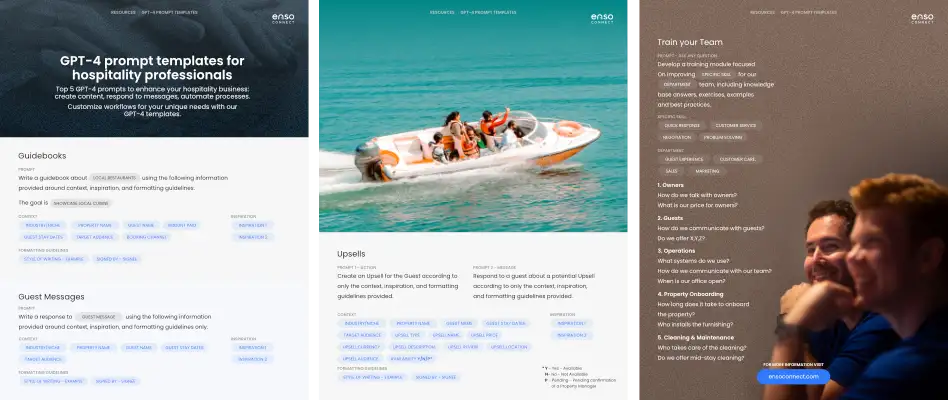
Who can use AI in vacation rentals?
If you have 10 or 20 properties, it may not be worth investing your time in using AI, even if it were feasible. Instead, it would be more beneficial to concentrate on expanding your property portfolio or investing in other areas.
You don’t really need AI solutions unless you have 100 properties or more. That’s when AI truly shines, as it can handle large volumes of data that would overwhelm the human brain.
It’s important to realize that AI alone won’t solve all your problems. The best way to make it work for you and your business is education and leveraging tools like Enso Connect, integrating tools like ChatGPT.
”"AI is really effective when you hit scale, and Enso Connect is a great entry point when you want to use AI to respond to guest inquiries and more"
Evan Dolgow
Will AI replace humans in vacation rentals?
”"AI is not going to replace people, but rather those who use AI will surpass those who do not."
Evan Dolgow
The truth is, by incorporating AI into their operations, individuals can significantly enhance their efficiency. Instead of handling one task at a time manually, operators can let AI do the heavy lifting.
Individuals can now effectively manage multiple tasks simultaneously, enabling them to achieve a 10-fold increase in productivity. The concept revolves around finding ways to boost revenue without the necessity of expanding the workforce proportionally. Deploying AI solutions effectively is the key to achieving this goal.
“EnsoAI is not a chatbot that will magically solve all your problems and eliminate your guest service team. Instead, it empowers your guest service team by providing them with the necessary tools. It ensures a consistent brand message and enables access to accurate information from various systems, eliminating the need to navigate multiple platforms.”
– Francois Gouelo
How to detect AI Vaporware?
Vaporware refers to software that lacks tangible substance or fails to materialize as promised. It is typically associated with companies that make grandiose claims and fail to deliver on their product or release it in a timely manner.
1. Examine the team’s credentials on platforms like LinkedIn. If the team members have recently emerged without a substantial track record, it is likely that their product lacks genuine artificial intelligence.
2. Evaluating the team’s background and past accomplishments provides valuable insights into whether they are building something legitimate or simply leveraging the AI branding.
Ethical concerns of using AI in short-term rentals
Deep fakes, bad actors and privacy issues are the biggest concern of using AI in short-term rentals.
It’s important to understand the risks and be mindful of the information shared with AI systems. Personalization and effective communication through AI have become industry expectations, and embracing AI can help businesses stay ahead. Compliance with privacy standards, such as GDPR, is crucial when handling global guest data.
Learn what EnsoAI can do for your hospitality business
